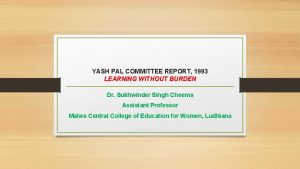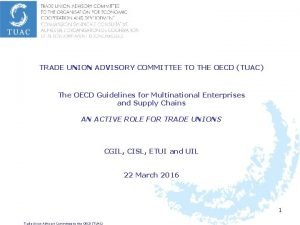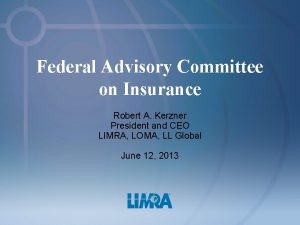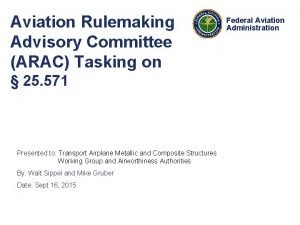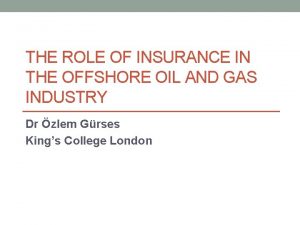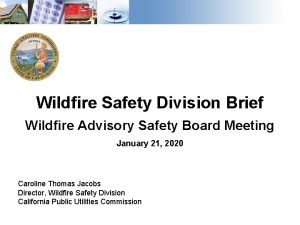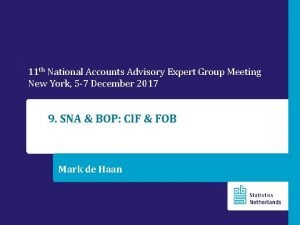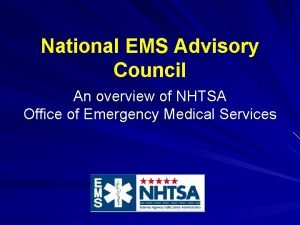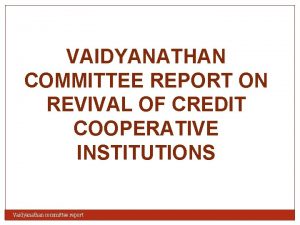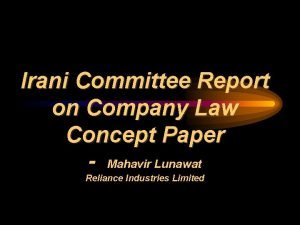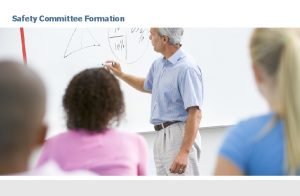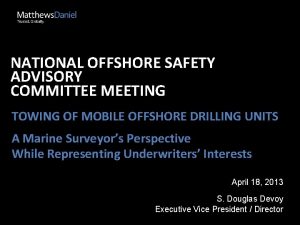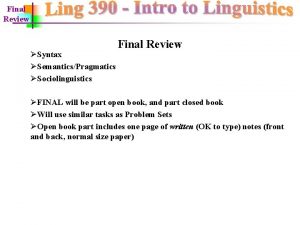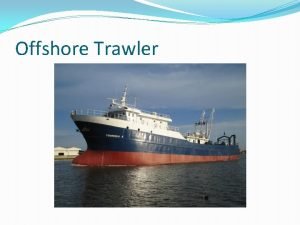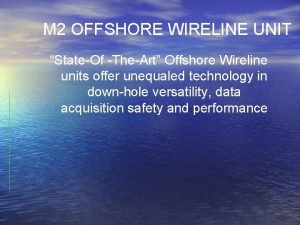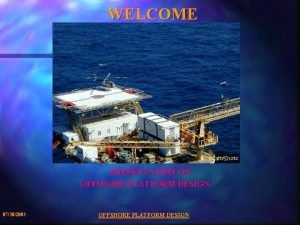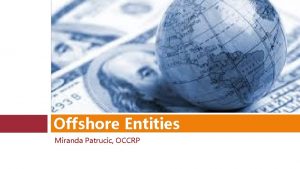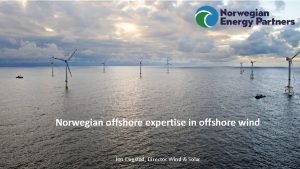NATIONAL OFFSHORE SAFETY ADVISORY COMMITTEE FINAL REPORT REVIEW














- Slides: 14

NATIONAL OFFSHORE SAFETY ADVISORY COMMITTEE FINAL REPORT REVIEW OF COAST GUARD ADVANCE NOTICE OF PROPOSED RULEMAKING FOR TRAINING OF PERSONNEL AND MANNING ON MOBILE OFFSHORE UNITS AND OFFSHORE SUPPLY VESSESLS ENGAGED IN U. S. OUTER CONTINENTAL SHELF ACTIVITIES

TASK STATEMENT The offshore mineral and oil industry on the U. S. Outer Continental Shelf (OCS) has expanded significantly in the last decade. With this expansion, technological advancements moved operations further offshore and into deeper water. Consequently, this extension of operations limits the availability of emergency resources in both response time and amount of assistance available. Today, more people and more companies are involved in exploration, drilling, production, anchor handling, diving, oil spill response operations, and other such activities than ever before. .

TASK STATEMENT Recent incidents, including the explosion on, and subsequent sinking of, the mobile offshore drilling unit (MODU) DEEPWATER HORIZON, highlight the need for maritime crew and persons other than crew working on the OCS to better understand decisionmaking authority and proper response actions in emergency situations, particularly since a large number of the maritime crew and persons other than crew work in hazardous conditions.

APRIL 14, 2014 FR USCG ISSUED THE ADVANCED NOTICE OF PROPOSED RULE MAKING (ANPRM) With this ANPRM, the Coast Guard’s goal is to enhance personnel preparedness for responding to emergencies such as fire, personal injury, and abandon ship situations in hazardous conditions. Additionally, the Coast Guard seeks to ensure that persons other than the crew receive basic maritime safety training on offshore supply vessels (OSVs) and Mobile Offshore Units (MOUs) engaged in OCS activities, regardless of flag. Further, they seek to ensure that this training is standardized and transferrable from one vessel type to another to avoid duplication of effort. CG announced their intent to promulgate regulations: 1. The ANPRM requested responses to numerous questions 2. With a open docket period until July 14, 2014 which was further extended to September 8, 2014 by request of Industry Associations.

TASK DELIVERABLES 1. Review the Training of Personnel and Manning ANPRM and provide answers to the Coast Guard on the included questions. 2. Provide comments / recommendations on other issues mentioned in the rule. 3. Provide comments / recommendations on any related issues not addressed in the ANPRM. 4. Provide a thorough explanation on the reasoning for the comments and recommendations. Due date of report November 19, 2014.

NOSAC SUBCOMMITTEE (SC) • Formed in mid April 2014 with committee membership and persons representing MOUs, OSVs, Liftboats, Floating Facilities which carry out operations on the USOCS • The SC held a total of 5 meetings. 3 by Teleconference and 2 physical present plus phone. • Total attendance varied from 19 to 23 persons in each meeting.

RECOMMENDATIONS • That USCG, if going forward with a NPRM: • coordinate its efforts in regards to requirements for additional safety training with BSEE • apply any regulations to all persons who work on or visit any U. S. and/or foreign flag MOU’s and OSV’s as well as to anyone working on or visiting a fixed platform or floating offshore installation on the U. S. OCS

RECOMMENDATIONS • make no additional requirements for Manning for MOUs (or OSVs) than that already exist for those vessels. The SC believes that Manning requirements for MOUs and or OSVs are met my existing flag state requirements complying with IMO Resolution A. 1047 (20) “Principles of Safe Manning” (Minimum Manning) • Make no additional requirements for Licensing of personnel for MOUs (or OSVs) than already exist for those Vessels.

RECOMMENDATIONS • In respect to the proposed Table 1 –”Maritime Safety Training for Persons Other than Crew on the U. S. OCS” (per IMO Resolution A. 1079 (28)), the Subcommittee recommends the following: • that a valid “Medical Certificate” with a validity of 2 years be in place for each and every visitor and “persons other than crew” with the responsibility of the employer for compliance of their own employees • that HUET (Helicopter Underwater Escape Training) be listed as a training requirement and renewed at 4 year intervals under all Categories for those who travel by helicopter

RECOMMENDATIONS • That the 1 st training under all Categories be revised to include “Safety Induction Training” (as outlined in IMO Resolution A. 1079 (28), Paragraph 5. 2 “Safety Induction Training and Instruction”) and be revised to read “Safety Induction Training, Instruction of Personal Survival Techniques and Workplace Safety, HUET and possess a valid Medical Certificate” • That the Category C description should be amended adding “, who has such responsibilities as shown on the unit’s Muster List. ”

RECOMMENDATIONS • that the second paragraph in Category D Training should be amended to read “Training in personal safety, fire prevention and fire -fighting, elementary first aid, personal safety and social responsibilities (BT in accordance with STCW Regulation VI/1 or equivalent)”.

RECOMMENDATIONS • The SC endorses the comments to the Docket submitted by IADC, API, OOC, OMSA and IMCA particularly those comments that point out the need for USCG and BSEE to coordinate their efforts for improving safety training rather than have separate and overlapping requirements. • The SC strongly recommends that the USCG should accept equivalent training standards and accept both U. S. and International industry training courses and equivalent company in-house training courses.

RECOMMENDATIONS • The SC recommends the USCG include Security Training for certain categories as part of the USCG’s proposed Table 1 (such training is currently in IMO Resolution A. 1079 (28)). • The SC recommends that USCG accept company verification of safety training rather than the individual having to provide documentation of his / her safety training. • The SC recommends that the USCG consider licensing issues for Floating Offshore Installations (FOIs).

IN CLOSING Thank you to the members of the Subcommittee, USCG representation in meetings and of course the co chairs. Gene Facey – Co Chair – NOSAC member Warren Weaver – Co Chair NOSAC member Bob Burnett – Co Chair – Hercules Offshore Christopher Woodle – Co Chair -- Chevron
 Who was the advocator of learning without burden
Who was the advocator of learning without burden Nasa astrophysics advisory committee
Nasa astrophysics advisory committee Trade union advisory committee
Trade union advisory committee Robert kerzner
Robert kerzner Aviation rulemaking advisory committee
Aviation rulemaking advisory committee Uncontrollable spending ap gov
Uncontrollable spending ap gov Welcar
Welcar Wildfire safety advisory board
Wildfire safety advisory board Advisory expert group on national accounts
Advisory expert group on national accounts National ems advisory council
National ems advisory council National mathematics advisory panel
National mathematics advisory panel Vaidyanathan committee 2004
Vaidyanathan committee 2004 Jj irani committee recommendations
Jj irani committee recommendations Cadbury report on corporate governance ppt
Cadbury report on corporate governance ppt Formation of safety committee
Formation of safety committee
